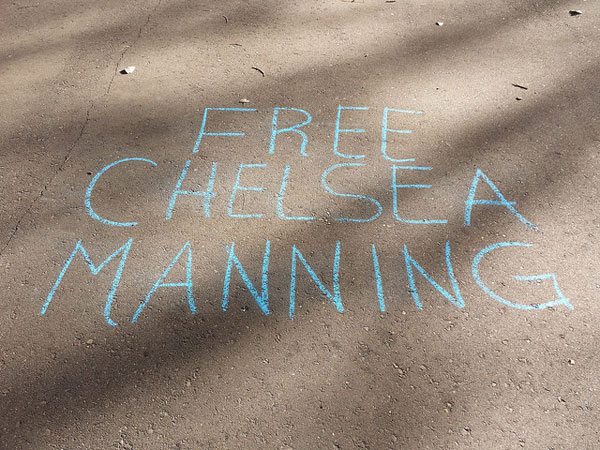
September 15, 2017; Boston Globe
There doesn’t appear to be any middle ground when it comes to Chelsea Manning—people either really support her or really don’t. Some view her deeds as heroic; a statue in Germany commemorates her and she was nominated for the Nobel Peace Prize. According to her testimony and that of a psychiatrist who testified during her court martial, she believed her leaks would change the perception of war and promote peace. One school of thought believes that, as a young private, when she copied then sent WikiLeaks classified sensitive U.S. military documents and videos, she could not fully understand the potential ramifications of her actions. On the other hand, her critics cite the history and evidence of her association with known hackers and political dissidents as evidence of her disagreement with U.S. military and political policies. Manning ticks off quite a few controversial boxes: transgender, transgender serviceperson, transgender serviceperson whose gender confirmation surgery was paid for by the military after a series of suicide attempts and hunger strikes, convicted felon, admitted traitor, convicted traitor, leaker, recipient of a very controversial commutation…and to some, hero and whistleblower.
The day that the Harvard Kennedy School announced Chelsea Manning as one of this semester’s Institute of Politics (IOP) visiting fellows, media and political reactions were swift. When the New York Times and other outlets reported the news, the story took on a life of its own.
The day following the announced Manning appointment, a current non-resident senior fellow at the school’s Belfer Center for Science and International Affairs, Michael Morell, both the former deputy director and twice acting director of the CIA under President Obama, resigned his fellowship. Morell said, “I cannot be a part of an organization, the Kennedy School, that honors a convicted felon and leaker of classified information.”
Later that same day, current CIA Director Mike Pompeo, appointed by President Trump, told the university he concurred with Morell, abruptly cancelling a scheduled appearance at the school’s Forum, prompting Kennedy School Dean Douglas W. Elmendorf to tell the assembled crowd that Pompeo was not there and would not speak. Pompeo said, “While I served my country as a soldier in the United States Army and will continue to defend Ms. Manning’s right to offer a defense of why she chose this path, I believe it is shameful for Harvard to place its stamp of approval upon her treasonous actions.”
Sign up for our free newsletters
Subscribe to NPQ's newsletters to have our top stories delivered directly to your inbox.
By signing up, you agree to our privacy policy and terms of use, and to receive messages from NPQ and our partners.
Although the IOP is housed at the Kennedy School, it is an undergraduate institution. The work of the institute is performed by undergraduates, and fellows’ seminars are off the Kennedy campus. Apparently, there’s no issue with her unduly influencing impressionable undergraduates. The thinking, according to IOP Acting Director Bill Delahunt, was that naming Manning would “broaden the range and depth of opportunity for students to hear from and engage with experts, leaders, and policy-shapers” and “address issues of LGBTQ identity in the military.” The publication Pink News cited her appointment as “the only LGBT-related fellowship in Harvard’s History.
Regardless, what appears to be the sticking point is the idea Harvard would bestow this “honor” on Chelsea Manning. Morrell alludes to it in his statement, Pompeo states it outright, and Dean Elmendorf tackles it head-on in his statement rescinding Manning’s fellow appointment.
We did not intend to honor her in any way or to endorse any of her words or deeds, as we do not honor or endorse any Fellow…I now think that designating Chelsea Manning as a Visiting Fellow was a mistake, for which I accept responsibility…Therefore, we are withdrawing the invitation to her to serve as a Visiting Fellow—and the perceived honor that it implies to some people—while maintaining the invitation for her to spend a day at the Kennedy School and speak in the Forum.
But this downplay of any honor associated with Manning’s appointment creates another conundrum. Of course, anyone designated as a fellow at Harvard—or any school—perceives it as an honor and themselves a member of a prestigious, exclusive club. Is this no longer true? Recently, the school was renamed Harvard Kennedy School after years as simply the Kennedy School, possibly in recognition that although Kennedy has cachet, Harvard has the prestige.
Manning chastised the school via Twitter for allowing the CIA to determine who teaches at the School. According to accounts, Manning hung up on Dean Elmendorf when he called with the news. Elmendorf assured Manning she was welcome to address students during a Forum event later this year. On Saturday, 12 student groups requested the dean reinstate the fellowship invitation.—Mary Frances Mitchner













